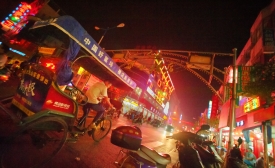soft power
India is planning a big cultural centre in Toronto along the lines of the famous Nehru Centre in London – the first of its kind in North America. The new cultural centre will be ready by next year to cater to the North America Indian diaspora. It is part of India’s thrust to use culture as a tool of its foreign policy.
Nations are brands because people perceive them as brands. Few Ghanaians have time to learn what most countries are really like, so we navigate through the complexity of the modern world armed with a few simple clichés about places. The writer wants to know: What about Ghana? What are we going to use as a brand to attract people from outside Ghana?
Just as the American culture industries, especially Hollywood, were instrumental in constructing and disseminating the narrative about the attraction of the United States that helped make it the most influential player on the world stage in the 20th century, the rise in the popularity of Bollywood films could help to do the same for India in the 21st.

Sherine B. Walton, Editor-in-Chief
Naomi Leight, Managing Editor
Tracy Bloom, Associate Editor
Vice-President Xi Jinping's recently concluded three-nation tour of Latin America is likely to further enhance China's relations with the region, experts said. Beyond its economic ties with Latin America, China is also interested in promoting its image internationally...China's infrastructure projects in the Caribbean are examples of non-economically motivated relationships in the region.
It’s official, at least as far as a Japanese government survey is concerned: Americans see China, rather than Japan, as their most important partner in Asia. The opinion leaders’ view offers even more emphatic confirmation that trade relations are increasingly carrying more weight than political or general ties with the U.S., usually cited as a reason for choosing Japan.
On Monday morning, David Cameron – in his first major initiative in development diplomacy in the UK – will chair a summit for pledges to the Global Alliance for Vaccines and Immunisation (Gavi). There's a shortfall of £2.3bn, and it's being seen as a litmus test of how well aid can survive in the age of austerity.
The alliance has grappled with diverging internal views over whether NATO should be an instrument of "hard" combat missions—generally the U.S. view—or the preference among some in Europe for "soft" power, like "humanitarian, development, peacekeeping, and talking tasks," as Gates put it.







